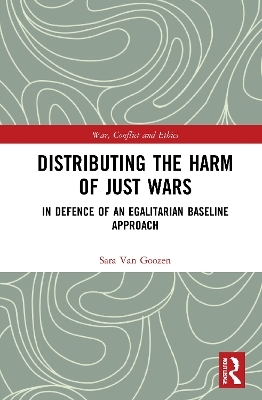
Distributing the Harm of Just Wars
In Defence of an Egalitarian Baseline
Seiten
2021
Routledge (Verlag)
978-0-367-43580-6 (ISBN)
Routledge (Verlag)
978-0-367-43580-6 (ISBN)
This book argues that the risk of harm in armed conflict should be divided equally between combatants and enemy non-combatants.
International law requires that combatants in war take ‘all feasible precautions’ to minimise damage to civilian objects, injury to civilians, and incidental loss of civilian life. However, there is no clear explanation of what ‘feasible precautions’ means in this context, or what would count as sufficiently minimised incidental harm. As a result, it is difficult to judge whether a particular war or offensive actually satisfies this requirement. Just war theorists often consider it common sense that merely not intending to harm innocent civilians is not sufficient, but there is little clarity in the literature regarding what this means. One crucial question that is almost always overlooked is that of what the appropriate baseline distribution of risk should be.
This book defends the Minimal Harm Requirement (MHR), which states that combatants should make an effort to reduce merely foreseen harm to enemy non-combatants to the lowest reasonable level. In order to assess which risk impositions are reasonable, and which are not, an egalitarian baseline should be adopted, suggesting that other things being equal risk of harm should be distributed equally between just combatants and unjust non-combatants.
This book will be of much interest to students of just war theory, ethics, security studies, and international relations.
International law requires that combatants in war take ‘all feasible precautions’ to minimise damage to civilian objects, injury to civilians, and incidental loss of civilian life. However, there is no clear explanation of what ‘feasible precautions’ means in this context, or what would count as sufficiently minimised incidental harm. As a result, it is difficult to judge whether a particular war or offensive actually satisfies this requirement. Just war theorists often consider it common sense that merely not intending to harm innocent civilians is not sufficient, but there is little clarity in the literature regarding what this means. One crucial question that is almost always overlooked is that of what the appropriate baseline distribution of risk should be.
This book defends the Minimal Harm Requirement (MHR), which states that combatants should make an effort to reduce merely foreseen harm to enemy non-combatants to the lowest reasonable level. In order to assess which risk impositions are reasonable, and which are not, an egalitarian baseline should be adopted, suggesting that other things being equal risk of harm should be distributed equally between just combatants and unjust non-combatants.
This book will be of much interest to students of just war theory, ethics, security studies, and international relations.
Sara Van Goozen is Associate Lecturer in Political Philosophy at the University of York, UK.
1. Introduction 2. Intentions, Attitudes, and Treating People as Ends-In-Themselves 3. The Requirement to Minimise Merely Foreseen Harm 4. The Egalitarian Baseline Approach 5. Harming Civilians and the Associative Duties of Soldiers 6. Consent and the Requirement to Minimise Foreseen Harm 7. Non-Combatants and the Requirement to Minimise Foreseen Harm 8. Increasing Merely Foreseen Harm to Non-Combatants 9. Conclusion
| Erscheinungsdatum | 16.03.2021 |
|---|---|
| Reihe/Serie | War, Conflict and Ethics |
| Zusatzinfo | 1 Tables, black and white; 1 Line drawings, black and white; 1 Illustrations, black and white |
| Verlagsort | London |
| Sprache | englisch |
| Maße | 156 x 234 mm |
| Gewicht | 417 g |
| Themenwelt | Geisteswissenschaften ► Philosophie ► Ethik |
| Sozialwissenschaften ► Politik / Verwaltung ► Politische Theorie | |
| ISBN-10 | 0-367-43580-2 / 0367435802 |
| ISBN-13 | 978-0-367-43580-6 / 9780367435806 |
| Zustand | Neuware |
| Informationen gemäß Produktsicherheitsverordnung (GPSR) | |
| Haben Sie eine Frage zum Produkt? |
Mehr entdecken
aus dem Bereich
aus dem Bereich


